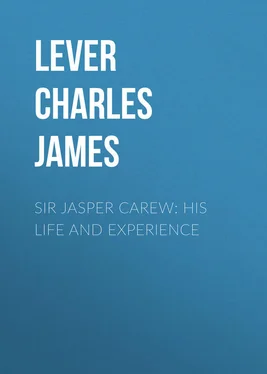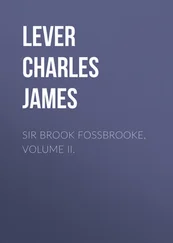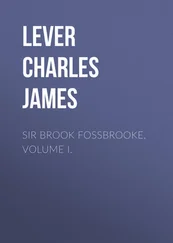Charles Lever - Sir Jasper Carew - His Life and Experience
Здесь есть возможность читать онлайн «Charles Lever - Sir Jasper Carew - His Life and Experience» — ознакомительный отрывок электронной книги совершенно бесплатно, а после прочтения отрывка купить полную версию. В некоторых случаях можно слушать аудио, скачать через торрент в формате fb2 и присутствует краткое содержание. Жанр: literature_19, foreign_antique, foreign_prose, на английском языке. Описание произведения, (предисловие) а так же отзывы посетителей доступны на портале библиотеки ЛибКат.
- Название:Sir Jasper Carew: His Life and Experience
- Автор:
- Жанр:
- Год:неизвестен
- ISBN:нет данных
- Рейтинг книги:5 / 5. Голосов: 1
-
Избранное:Добавить в избранное
- Отзывы:
-
Ваша оценка:
- 100
- 1
- 2
- 3
- 4
- 5
Sir Jasper Carew: His Life and Experience: краткое содержание, описание и аннотация
Предлагаем к чтению аннотацию, описание, краткое содержание или предисловие (зависит от того, что написал сам автор книги «Sir Jasper Carew: His Life and Experience»). Если вы не нашли необходимую информацию о книге — напишите в комментариях, мы постараемся отыскать её.
Sir Jasper Carew: His Life and Experience — читать онлайн ознакомительный отрывок
Ниже представлен текст книги, разбитый по страницам. Система сохранения места последней прочитанной страницы, позволяет с удобством читать онлайн бесплатно книгу «Sir Jasper Carew: His Life and Experience», без необходимости каждый раз заново искать на чём Вы остановились. Поставьте закладку, и сможете в любой момент перейти на страницу, на которой закончили чтение.
Интервал:
Закладка:
Such was the state of matters as my father, still weak from his attack, descended, for the first time, to the drawing-room. MacNaghten had persuaded my mother to accompany him on a short drive through the grounds, when my father, whom they had left in his room, thought he would make an effort to get downstairs, and surprise them on their return. He was seated at an open window that looked out upon a flower-garden, enjoying, with all an invalid’s relish, the balmy air of a summer’s day, and feeling as if he drank in health at every stir of the leaves by the light wind. His illness had not only greatly debilitated him, but had even induced a degree of indolent inaction very foreign to the active habit of his mind in health; and instead of experiencing his wonted curiosity to know what the world had been doing during his illness, he was actually happy in the thought of the perfect repose he was enjoying, undisturbed by a single care. The rattling of wheels on the ground at last gave token of some one coming, and a few moments after, my father heard the sound of voices in the hall. Resolved to deny himself to all strangers, he had risen to reach the bell, when the door opened, and Rutledge entered.
“Why, they told me you were in bed, Carew,” cried he, endeavoring by a half-jocular manner to conceal the shock my father’s wasted appearance imparted. “They said I could not possibly see you, so that I had to send up a few lines on my card to say how urgently I wished it, and meanwhile came in to await your answer.”
“They only said truly,” muttered my father. “I have crept down to-day for the first time, and I ‘m not quite sure that I have done prudently.”
“What has it been? – gout – rheumatic fever?”
“Neither; a bad cold neglected, and then an old ague on the back of it.”
“And of course the fellows have bled and blistered you, without mercy. My medical skill is borrowed from the stable: hot mashes and double body-clothes are generally enough for a common attack. But rich fellows like you cannot get off so cheaply. And madam – how is she?”
“Perfectly well, thank you. And how are all your friends?”
“As well as men can be who are worried and badgered every hour of the twenty-four. It ‘s no use in sending Englishmen here, they are never trusted! I don’t believe it’s possible to find an honester man, nor a truer friend to Ireland, than Portland; but his Saxon blood is quite enough to mar his utility and poison every effort he makes to be of service.”
“The children are paying off the scores of their fathers, Rutledge. The sentiment that has taken some centuries to mature, can scarcely be treated like a mere prejudice.”
“Very true; but what bad policy it is – as policy – to obstruct the flow of concessions, even coming from a suspected channel. It ‘s rather too hard to criticise them for doing the very things we ask them.”
“I have not looked into a newspaper these few weeks,” said my father, half wearied of the theme.
“So that you know nothing, then, of – ” He stopped short, for he just caught himself in time.
“I know nothing whatever of the events that have occurred in that interval; and – however inglorious the confession, Rutledge, I must make it – I ‘d almost as soon live over my attack again as hear them. Take it as a sick man’s peevishness or sound philosophy, as you may; but, in the jarring, squabbling world we live in, there ‘s nothing so good as to let bygones be bygones.”
“That’s taking for granted that anything is ever a ‘bygone,’ Walter; but, faith, my experience says that we are feeling, to the end of centuries, the results of the petty mischances that befell us in the beginning of them.”
My father sighed, but it was more in weariness than sorrow; and Rutledge said, —
“I came out to have a long chat with you, Walter, about various things; but I fear talking fatigues you.”
“It does fatigue me, – I’m not equal to it,” said my father, faintly.
“It’s unlucky too,” said the other, half peevishly, “one so seldom can catch you alone; and though MacNaghten is the best fellow in the world – ”
“You must still say nothing against him, at least in my hearing,” added my father, as if to finish the sentence for him.
“I was only going to observe that in all that regards politics – ”
“Pardon my interrupting you again,” broke in my father, “but Dan never pretended to know anything about them; nor is it likely that a fellow that felt the turf a contamination will try to cultivate his morals by the intrigues of party.”
Rutledge affected to laugh at the sneering remark, and after a moment resumed, —
“Do you know, then, it was precisely about that very subject of politics I came out to talk with you to-day. The Duke told me of the generous way you expressed yourself to him during his visit here, and that although not abating anything of your attachment to what you feel a national cause, you never would tie yourself hand and foot to party, but stand free to use your influence at the dictates of your own honest conviction. Now, although there is no very important question at issue, there are a number of petty, irritating topics kept continually before Parliament by the Irish party, which, without the slightest pretension to utility, are used as means of harassing and annoying the Government.”
“I never heard of this before, Rutledge; but I know well, if the measures you speak of have Grattan and Flood and Ponsonby, and others of the same stamp, to support them, they are neither frivolous nor contemptible; and if they be not advocated by the leaders of the Irish party, you can afford to treat them with better temper.”
“Be that as it may, Walter, the good men of the party do not side with these fellows. But I see all this worries you, so let ‘s forget it!” And so, taking a turn through the room, he stopped opposite a racing print, and said: “Poor old Gadfly, how she reminds me of old times! going along with her head low, and looking dead-beat when she was just coming to her work. That was the best mare ever you had, Carew!”
“And yet I lost heavily on her,” said my father, with a half sigh.
“Lost! Why the report goes that you gained above twenty thousand by her the last year she ran.”
“‘Common report,’ as Figaro says, ‘is a common liar;’ my losses were very nearly one-half more! It was a black year in my life. I began it badly in Ireland, and ended it worse abroad!”
The eager curiosity with which Rutledge listened, suddenly caught my father’s attention, and he stopped short, saying: “These are old stories now, and scarcely worth remembering. But here comes my wife; she ‘ll be glad to see you, and hear all the news of the capital, for she has been leading a stupid life of it these some weeks back.”
However uneasy my mother and MacNaghten might have been lest Rutledge should have alluded to the newspaper attacks, they were soon satisfied on that point, and the evening passed over pleasantly in discussing the sayings and doings of the Dublin world.
It was late when Rutledge rose to take his leave, and my father had so far rallied by the excitement of conversation that he already felt himself restored to health; and his last words to his guest at parting were, —
“I’ll call and see you, Rutledge, before the week is over.”
CHAPTER XII. SHOWING THAT “WHAT IS CRADLED IN SHAME IS HEARSED IN
SORROW.”
Accustomed all his life to the flattery which surrounds a position of some eminence, my father was not a little piqued at the coldness of his friends during his illness. The inquiries after him were neither numerous nor hearty. Some had called once or twice to ask how he was; others had written brief excuses for their absence; and many contented themselves with hearing that it was a slight attack, which a few days would see the end of. Perhaps there were not many men in the kingdom less given to take umbrage at trifles than my father. Naturally disposed to take the bold and open line of action in every affair of life, he never suspected the possibility of a covert insult; and that any one could cherish ill-feeling to another, without a palpable avowal of hostility, was a thing above his conception. At any other time, therefore, this negligence, or indifference, or whatever it was, would not have occasioned him a moment’s unpleasantness. He would have explained it to himself in a dozen ways, if it ever occurred to him to require explanation. Now, however, he was irritable from the effects of a malady peculiarly disposed to ruffle nervous susceptibility; while the chagrin of the late Viceregal visit, and its abrupt termination, was still over him. There are little eras in the lives of the best-tempered men, when everything is viewed in wrong and discordant colors, and when, by a perverse ingenuity, they seek out reasons for their own unhappiness in events and incidents that have no possible bearing on the question. Having once persuaded himself that his friends were faithless to him, he set about accounting for it by every casuistry he could think of. I have lived too long abroad; I have mixed too much in the great world, thought he, to be able to conform to this small and narrow circle. I am not local enough for them. I cannot trade on the petty prejudices they love to cherish, and which they foolishly think means being national. My wider views of life are a rebuke to their pettiness; and it ‘s clear we do not suit each other. To preserve my popularity I should have lived at home, and married at home; never soared beyond a topic of Irish growth, and voted at the tail of those two or three great men who comprise within themselves all that we know of Irish independence. “Even idolatry would be dear at that price,” cried he, aloud, at the end of his reflections, – bitter and unpleasant reveries in which he had been sunk as he travelled up to town some few days after the events related in the last chapter.
Читать дальшеИнтервал:
Закладка:
Похожие книги на «Sir Jasper Carew: His Life and Experience»
Представляем Вашему вниманию похожие книги на «Sir Jasper Carew: His Life and Experience» списком для выбора. Мы отобрали схожую по названию и смыслу литературу в надежде предоставить читателям больше вариантов отыскать новые, интересные, ещё непрочитанные произведения.
Обсуждение, отзывы о книге «Sir Jasper Carew: His Life and Experience» и просто собственные мнения читателей. Оставьте ваши комментарии, напишите, что Вы думаете о произведении, его смысле или главных героях. Укажите что конкретно понравилось, а что нет, и почему Вы так считаете.











